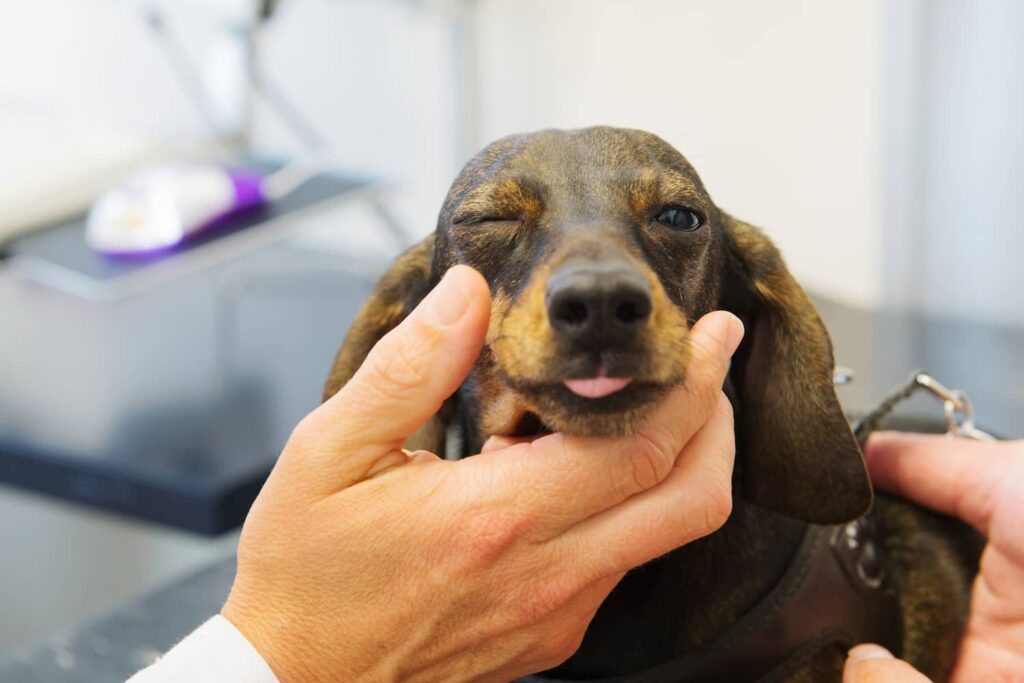Dogs, our beloved furry companions, communicate with us in many ways, and one of those ways is through their eyes. While a wagging tail might signal happiness, a squinting eye can mean a variety of things. Understanding why dogs squint can help us better interpret their behavior and ensure their well-being.
Why Do Dogs Squint Their Eyes?
Common Reasons for Squinting in Dogs
There are several reasons why a dog might squint their eyes. Some are harmless, while others could indicate a health issue. It’s important to pay attention to the context and other accompanying behaviors to determine the cause.
1. Sun Protection
Just like humans, dogs can squint to protect their eyes from bright sunlight. If your dog is squinting outdoors on a sunny day, it’s likely a natural reflex to reduce glare and discomfort.
2. Eye Irritation
Foreign objects, dust, pollen, or even excessive tear production can irritate a dog’s eyes, causing them to squint. This is often accompanied by other signs like pawing at the eye, redness, or discharge.
3. Pain or Discomfort
Squinting can also be a sign of pain or discomfort in the eye or surrounding area. This could be due to an injury, infection, or a more serious condition like glaucoma.
4. Cognitive Decline
In older dogs, squinting can sometimes be a symptom of cognitive decline, similar to dementia in humans. This is often accompanied by other behavioral changes, such as confusion, disorientation, or changes in sleep patterns. (See Also: What To Do When Dog Licks Paw Raw)
5. Underlying Medical Conditions
Certain medical conditions, such as cataracts, cherry eye, or entropion, can also cause squinting in dogs. These conditions require veterinary attention.
When to See a Veterinarian
While occasional squinting might be harmless, it’s important to consult your veterinarian if you notice any of the following:
- Persistent squinting that doesn’t improve
- Squinting accompanied by other symptoms, such as redness, discharge, pawing at the eye, or changes in behavior
- Sudden onset of squinting
- Squinting in conjunction with other signs of illness, such as lethargy, loss of appetite, or vomiting
Early detection and treatment of eye problems can help prevent vision loss and improve your dog’s overall health and well-being.
Recap
Understanding why dogs squint can provide valuable insights into their health and well-being. While squinting can be a normal response to bright sunlight or eye irritation, it can also signal more serious underlying conditions.
By paying attention to the context and other accompanying behaviors, and seeking veterinary care when necessary, we can ensure our furry friends have healthy and happy eyes.

FAQs
Is squinting a sign of pain in dogs?
Squinting can sometimes be a sign of pain or discomfort in dogs, especially if it’s accompanied by other symptoms like pawing at the eyes, redness, discharge, or sensitivity to light. It could indicate an eye infection, injury, or irritation.
Why do dogs squint in bright sunlight?
Just like humans, dogs squint to protect their eyes from bright sunlight. Squinting reduces the amount of light entering their eyes, preventing discomfort and potential damage.
Can squinting be a sign of a neurological problem in dogs?
In some cases, persistent or unusual squinting could be a sign of a neurological problem affecting the muscles controlling the eyelids or vision. If you notice any other concerning symptoms alongside squinting, consult your veterinarian.
What should I do if my dog is squinting?
If your dog is squinting occasionally and seems otherwise healthy, it’s likely nothing to worry about. However, if the squinting is persistent, accompanied by other symptoms, or you notice any changes in your dog’s behavior or vision, it’s best to consult your veterinarian for a proper diagnosis and treatment.
How can I help my dog’s eyes from getting irritated?
You can help protect your dog’s eyes by keeping them clean, providing shade from direct sunlight, and avoiding exposure to irritants like smoke, dust, and chemicals. Regularly check their eyes for any signs of redness, discharge, or irritation.
